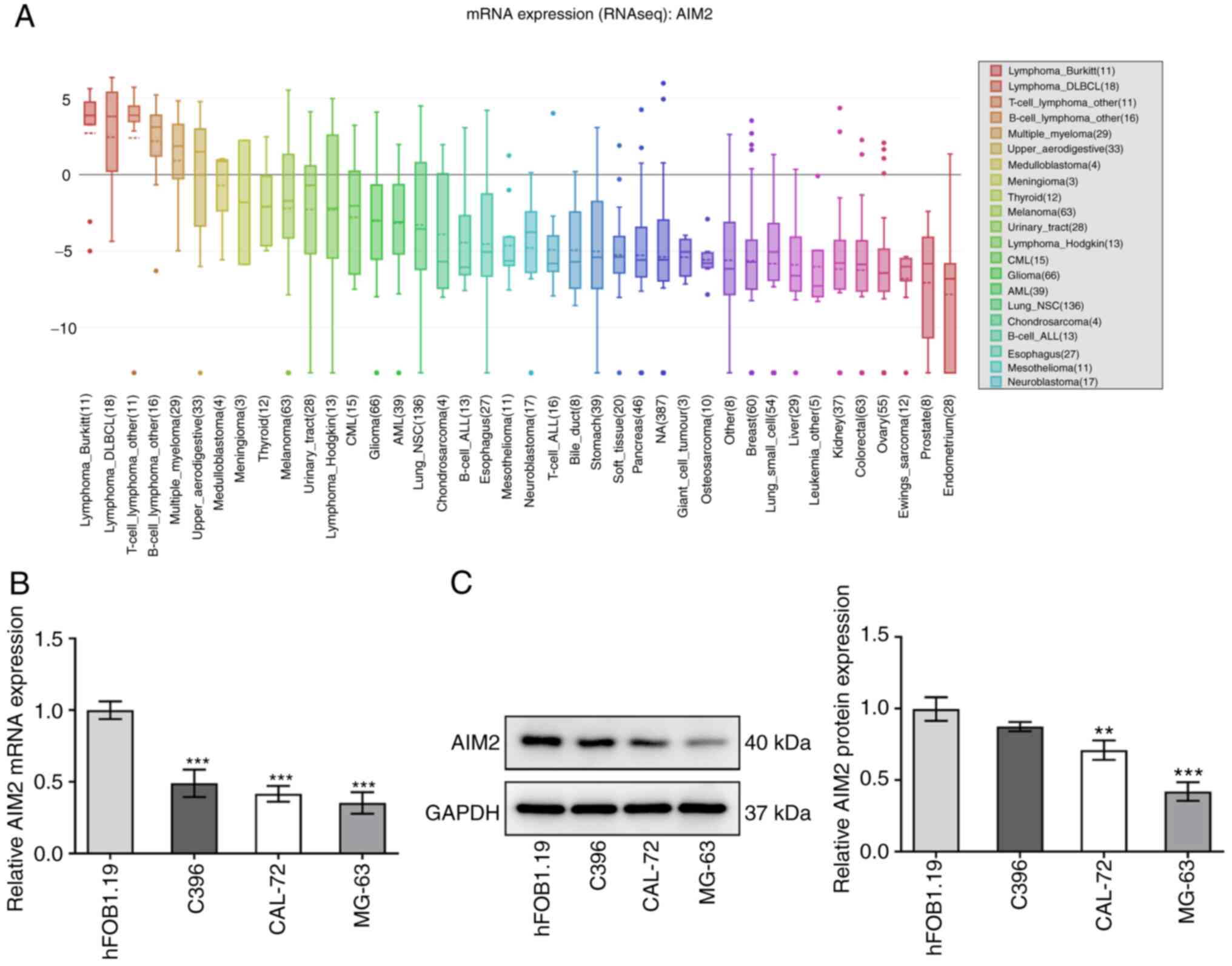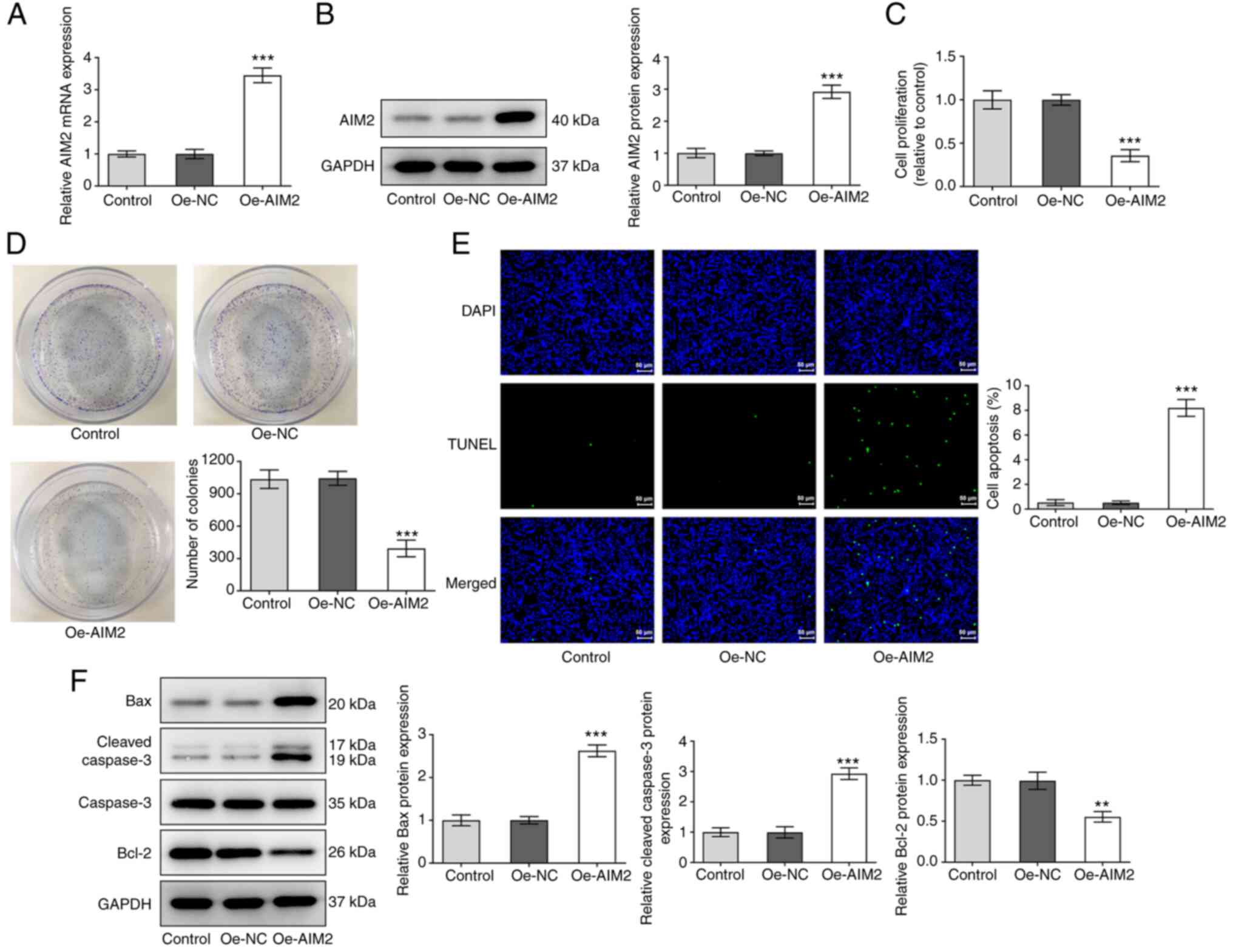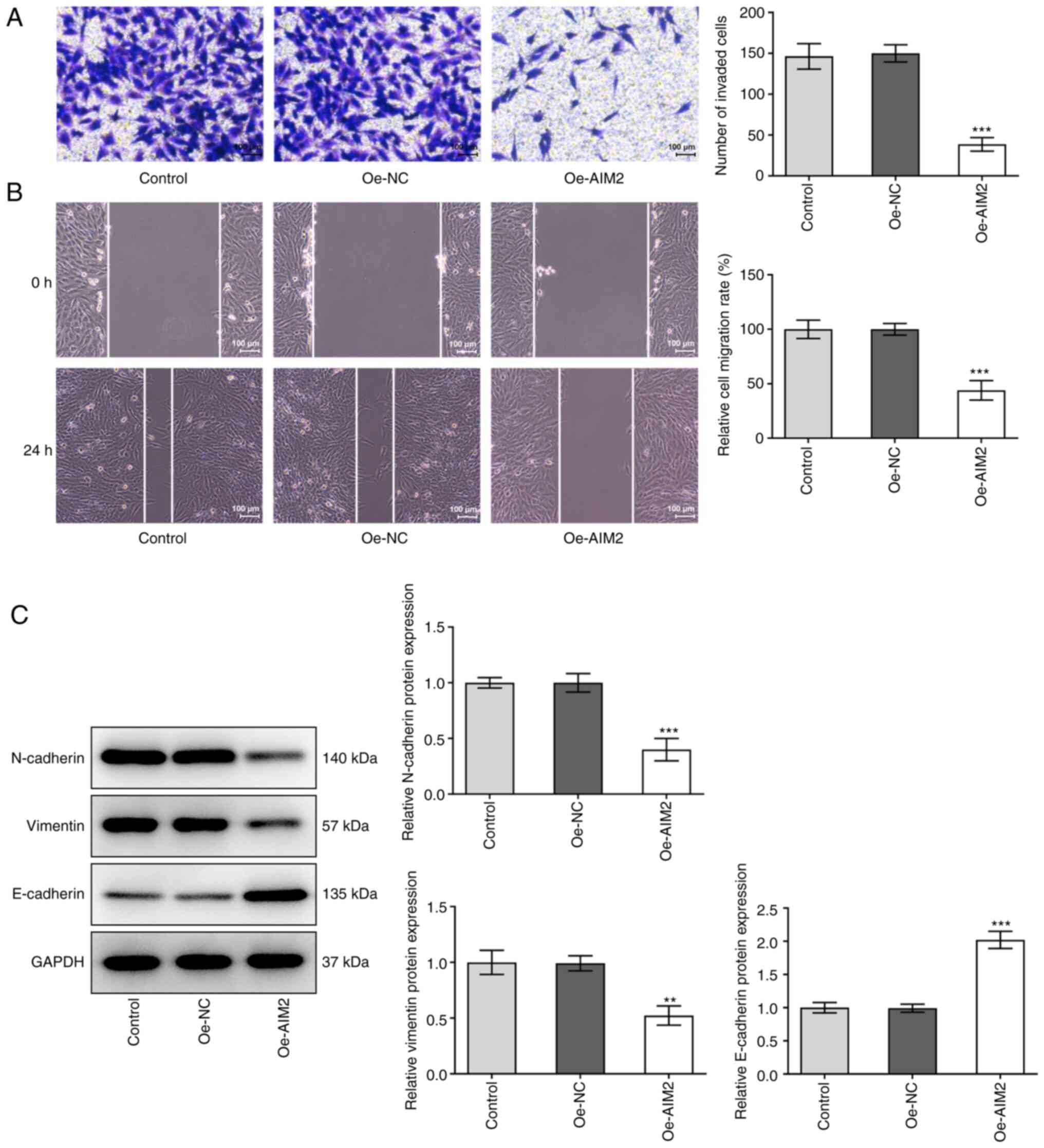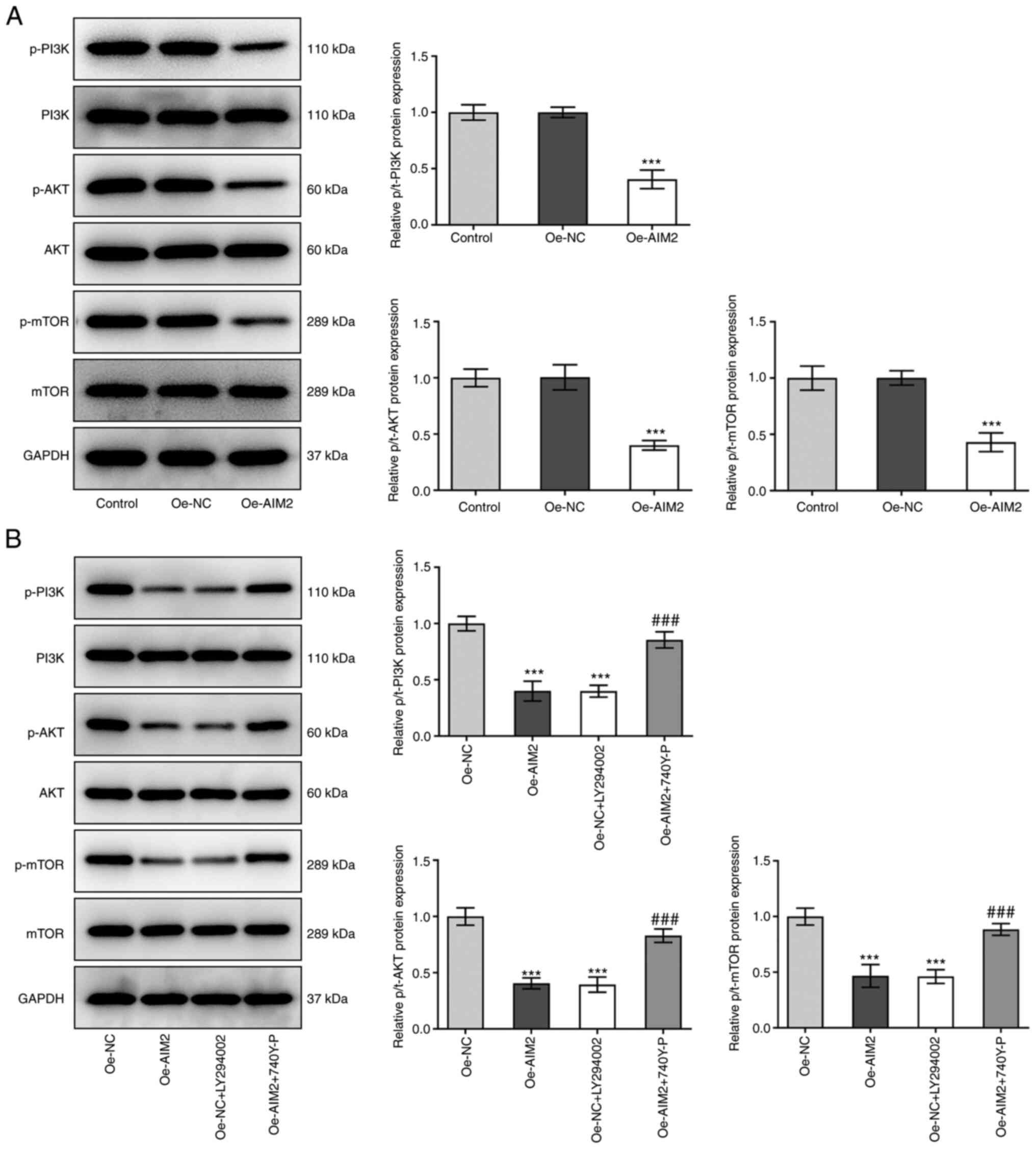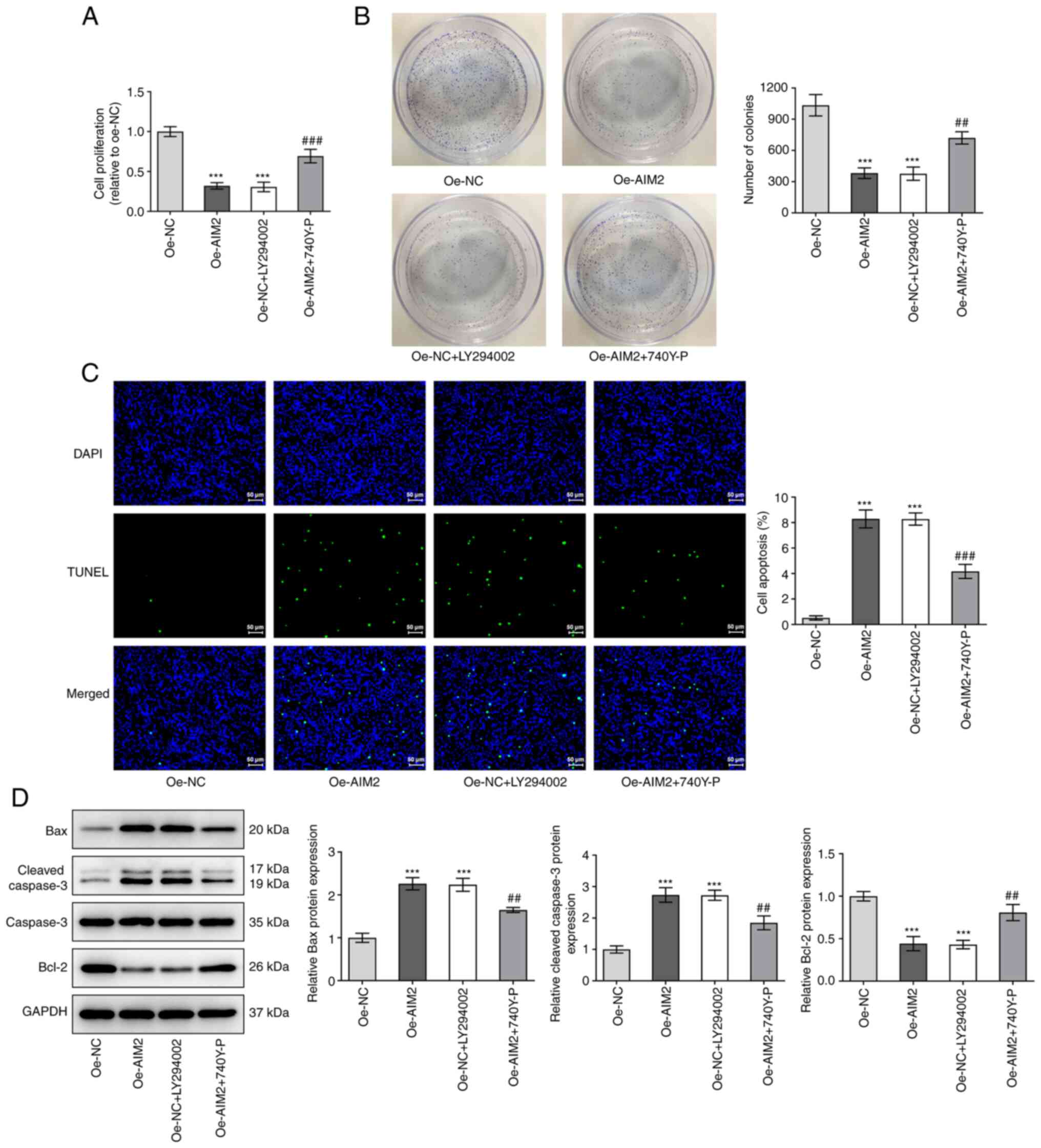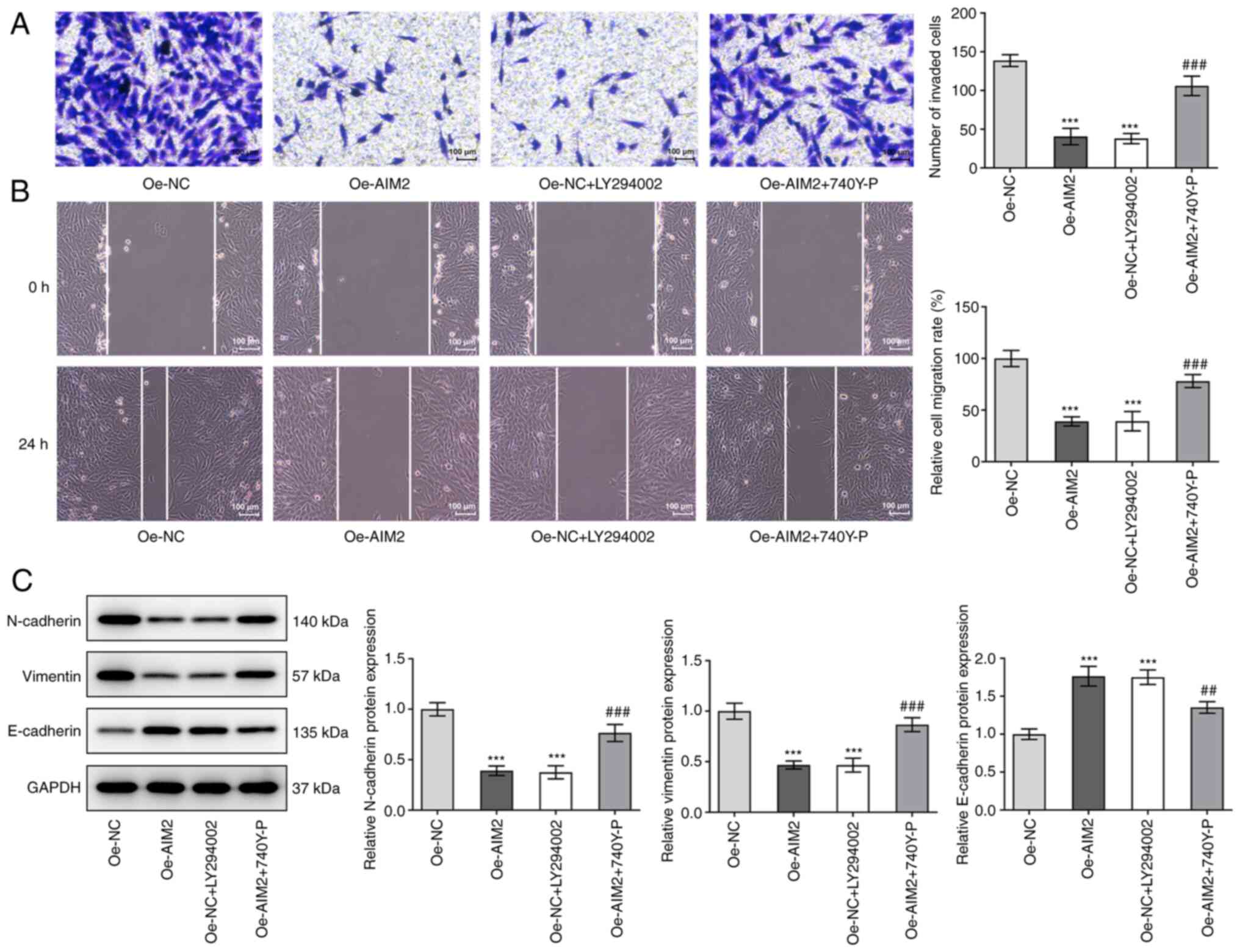|
1
|
Raymond AK and Jaffe N: Osteosarcoma
multidisciplinary approach to the management from the pathologist's
perspective. Cancer Treat Res. 152:63–84. 2009. View Article : Google Scholar : PubMed/NCBI
|
|
2
|
Cortini M, Avnet S and Baldini N:
Mesenchymal stroma: Role in osteosarcoma progression. Cancer Lett.
405:90–99. 2017. View Article : Google Scholar : PubMed/NCBI
|
|
3
|
Luetke A, Meyers PA, Lewis I and Juergens
H: Osteosarcoma treatment-where do we stand? A state of the art
review. Cancer Treat Rev. 40:523–532. 2014. View Article : Google Scholar : PubMed/NCBI
|
|
4
|
Lin H, Zheng X, Lu T, Gu Y, Zheng C and
Yan H: The proliferation and invasion of osteosarcoma are inhibited
by miR-101 via targetting ZEB2. Biosci Rep. Feb 8–2019.(Epub ahead
of print). doi: 10.1042/BSR20181283. View Article : Google Scholar
|
|
5
|
Bielack SS, Kempf-Bielack B, Delling G,
Exner GU, Flege S, Helmke K, Kotz R, Salzer-Kuntschik M, Werner M,
Winkelmann W, et al: Prognostic factors in high-grade osteosarcoma
of the extremities or trunk: An analysis of 1,702 patients treated
on neoadjuvant cooperative osteosarcoma study group protocols. J
Clin Oncol. 20:776–790. 2002. View Article : Google Scholar : PubMed/NCBI
|
|
6
|
Moore DD and Luu HH: Osteosarcoma. Cancer
Treat Res. 162:65–92. 2014. View Article : Google Scholar : PubMed/NCBI
|
|
7
|
Lugrin J and Martinon F: The AIM2
inflammasome: Sensor of pathogens and cellular perturbations.
Immunol Rev. 281:99–114. 2018. View Article : Google Scholar : PubMed/NCBI
|
|
8
|
Komada T, Chung H, Lau A, Platnich JM,
Beck PL, Benediktsson H, Duff HJ, Jenne CN and Muruve DA:
Macrophage uptake of necrotic cell DNA activates the AIM2
inflammasome to regulate a proinflammatory phenotype in CKD. J Am
Soc Nephrol. 29:1165–1181. 2018. View Article : Google Scholar : PubMed/NCBI
|
|
9
|
Zhao ZZ, Zheng XL and Jiang ZS: Emerging
roles of absent in melanoma 2 in cardiovascular diseases. Clin Chim
Acta. 511:14–23. 2020. View Article : Google Scholar : PubMed/NCBI
|
|
10
|
Wilson JE, Petrucelli AS, Chen L,
Koblansky AA, Truax AD, Oyama Y, Rogers AB, Brickey WJ, Wang Y,
Schneider M, et al: Inflammasome-independent role of AIM2 in
suppressing colon tumorigenesis via DNA-PK and Akt. Nat Med.
21:906–913. 2015. View
Article : Google Scholar : PubMed/NCBI
|
|
11
|
Ma X, Guo P, Qiu Y, Mu K, Zhu L, Zhao W,
Li T and Han L: Loss of AIM2 expression promotes hepatocarcinoma
progression through activation of mTOR-S6K1 pathway. Oncotarget.
7:36185–36197. 2016. View Article : Google Scholar : PubMed/NCBI
|
|
12
|
Ponomareva L, Liu H, Duan X, Dickerson E,
Shen H, Panchanathan R and Choubey D: AIM2, an IFN-inducible
cytosolic DNA sensor, in the development of benign prostate
hyperplasia and prostate cancer. Mol Cancer Res. 11:1193–1202.
2013. View Article : Google Scholar : PubMed/NCBI
|
|
13
|
Chen IF, Ou-Yang F, Hung JY, Liu JC, Wang
H, Wang SC, Hou MF, Hortobagyi GN and Hung MC: AIM2 suppresses
human breast cancer cell proliferation in vitro and mammary tumor
growth in a mouse model. Mol Cancer Ther. 5:1–7. 2006. View Article : Google Scholar : PubMed/NCBI
|
|
14
|
Kondo Y, Nagai K, Nakahata S, Saito Y,
Ichikawa T, Suekane A, Taki T, Iwakawa R, Enari M, Taniwaki M, et
al: Overexpression of the DNA sensor proteins, absent in melanoma 2
and interferon-inducible 16, contributes to tumorigenesis of oral
squamous cell carcinoma with p53 inactivation. Cancer Sci.
103:782–790. 2012. View Article : Google Scholar : PubMed/NCBI
|
|
15
|
Farshchian M, Nissinen L, Siljamaki E,
Riihilä P, Piipponen M, Kivisaari A, Kallajoki M, Grénman R,
Peltonen J, Peltonen S, et al: Tumor cell-specific AIM2 regulates
growth and invasion of cutaneous squamous cell carcinoma.
Oncotarget. 8:45825–45836. 2017. View Article : Google Scholar : PubMed/NCBI
|
|
16
|
Zhang M, Jin C, Yang Y, Wang K, Zhou Y,
Zhou Y, Wang R, Li T and Hu R: AIM2 promotes non-small-cell lung
cancer cell growth through inflammasome-dependent pathway. J Cell
Physiol. 234:20161–20173. 2019. View Article : Google Scholar : PubMed/NCBI
|
|
17
|
Hu K, Dai HB and Qiu ZL: mTOR signaling in
osteosarcoma: Oncogenesis and therapeutic aspects (Review). Oncol
Rep. 36:1219–1225. 2016. View Article : Google Scholar : PubMed/NCBI
|
|
18
|
Xu M, Wang J, Li H, Zhang Z and Cheng Z:
AIM2 inhibits colorectal cancer cell proliferation and migration
through suppression of Gli1. Aging (Albany NY). 13:1017–1031. 2020.
View Article : Google Scholar : PubMed/NCBI
|
|
19
|
Zhang Y, Weng Q, Han J and Chen J:
Alantolactone suppresses human osteosarcoma through the PI3K/AKT
signaling pathway. Mol Med Rep. 21:675–684. 2020.PubMed/NCBI
|
|
20
|
Livak KJ and Schmittgen TD: Analysis of
relative gene expression data using real-time quantitative PCR and
the 2(−Delta Delta C(T)) method. Methods. 25:402–408. 2001.
View Article : Google Scholar : PubMed/NCBI
|
|
21
|
Sharma BR, Karki R and Kanneganti TD: Role
of AIM2 inflammasome in inflammatory diseases, cancer and
infection. Eur J Immunol. 49:1998–2011. 2019. View Article : Google Scholar : PubMed/NCBI
|
|
22
|
Li Y, Wang W, Li A, Huang W, Chen S, Han F
and Wang L: Dihydroartemisinin induces pyroptosis by promoting the
AIM2/caspase-3/DFNA5 axis in breast cancer cells. Chem Biol
Interact. 340:1094342021. View Article : Google Scholar : PubMed/NCBI
|
|
23
|
Wang B, Tian Y and Yin Q: AIM2
inflammasome assembly and signaling. Adv Exp Med Biol.
1172:143–155. 2019. View Article : Google Scholar : PubMed/NCBI
|
|
24
|
Jin H, Jin X, Cao B and Wang W: Berberine
affects osteosarcoma via downregulating the caspase-1/IL-1β
signaling axis. Oncol Rep. 37:729–736. 2017. View Article : Google Scholar : PubMed/NCBI
|
|
25
|
Sun Y and Guo Y: Expression of Caspase-1
in breast cancer tissues and its effects on cell proliferation,
apoptosis and invasion. Oncol Lett. 15:6431–6435. 2018.PubMed/NCBI
|
|
26
|
Huang TH, Zhang P, Li W, Zhao T, Zhang Z,
Chen S, Yang Y, Feng Y, Li F, Shirley Liu X, et al: G9A promotes
tumor cell growth and invasion by silencing CASP1 in non-small-cell
lung cancer cells. Cell Death Dis. 8:e27262017. View Article : Google Scholar : PubMed/NCBI
|
|
27
|
Seyfried TN and Huysentruyt LC: On the
origin of cancer metastasis. Crit Rev Oncog. 18:43–73. 2013.
View Article : Google Scholar : PubMed/NCBI
|
|
28
|
Avanzini S and Antal T: Cancer recurrence
times from a branching process model. PLoS Comput Biol.
15:e10074232019. View Article : Google Scholar : PubMed/NCBI
|
|
29
|
Patsos G, Germann A, Gebert J and Dihlmann
S: Restoration of absent in melanoma 2 (AIM2) induces G2/M cell
cycle arrest and promotes invasion of colorectal cancer cells. Int
J Cancer. 126:1838–1849. 2010. View Article : Google Scholar : PubMed/NCBI
|
|
30
|
Man SM, Zhu Q, Zhu L, Liu Z, Karki R,
Malik A, Sharma D, Li L, Malireddi RK, Gurung P, et al: Critical
Role for the DNA Sensor AIM2 in stem cell proliferation and cancer.
Cell. 162:45–58. 2015. View Article : Google Scholar : PubMed/NCBI
|
|
31
|
Chen J, Wang Z and Yu S: AIM2 regulates
viability and apoptosis in human colorectal cancer cells via the
PI3K/Akt pathway. Onco Targets Ther. 10:811–817. 2017. View Article : Google Scholar : PubMed/NCBI
|
|
32
|
Poh L, Fann DY, Wong P, Lim HM, Foo SL,
Kang SW, Rajeev V, Selvaraji S, Iyer VR, Parathy N, et al: AIM2
inflammasome mediates hallmark neuropathological alterations and
cognitive impairment in a mouse model of vascular dementia. Mol
Psychiatry. 26:4544–4560. 2021. View Article : Google Scholar : PubMed/NCBI
|
|
33
|
Chai D, Shan H, Wang G, Li H, Fang L, Song
J, Zhang Q, Bai J and Zheng J: AIM2 is a potential therapeutic
target in human renal carcinoma and suppresses its invasion and
metastasis via enhancing autophagy induction. Exp Cell Res.
370:561–570. 2018. View Article : Google Scholar : PubMed/NCBI
|
|
34
|
Chen SL, Liu LL, Lu SX, Luo RZ, Wang CH,
Wang H, Cai SH, Yang X, Xie D, Zhang CZ and Yun JP: HBx-mediated
decrease of AIM2 contributes to hepatocellular carcinoma
metastasis. Mol Oncol. 11:1225–1240. 2017. View Article : Google Scholar : PubMed/NCBI
|
|
35
|
Xia P and Xu XY: PI3K/Akt/mTOR signaling
pathway in cancer stem cells: From basic research to clinical
application. Am J Cancer Res. 5:1602–1609. 2015.PubMed/NCBI
|
|
36
|
Zhang J, Yu XH, Yan YG, Wang C and Wang
WJ: PI3K/Akt signaling in osteosarcoma. Clin Chim Acta.
444:182–192. 2015. View Article : Google Scholar : PubMed/NCBI
|
|
37
|
Ersahin T, Tuncbag N and Cetin-Atalay R:
The PI3K/AKT/mTOR interactive pathway. Mol Biosyst. 11:1946–1954.
2015. View Article : Google Scholar : PubMed/NCBI
|
|
38
|
Tang H, Zhu D, Zhang G, Luo X and Xie W:
AFAP1-AS1 promotes proliferation of pituitary adenoma cells through
miR-103a-3p to Activate PI3K/AKT signaling pathway. World
Neurosurg. 130:e888–e898. 2019. View Article : Google Scholar : PubMed/NCBI
|
|
39
|
Rodrigues Alves AP, Fernandes JC, Fenerich
BA, Coelho-Silva JL, Scheucher PS, Simões BP, Rego EM, Ridley AJ,
Machado-Neto JA and Traina F: IGF1R/IRS1 targeting has cytotoxic
activity and inhibits PI3K/AKT/mTOR and MAPK signaling in acute
lymphoblastic leukemia cells. Cancer Lett. 456:59–68. 2019.
View Article : Google Scholar : PubMed/NCBI
|
|
40
|
Wang B and Li J: Piceatannol suppresses
the proliferation and induced apoptosis of osteosarcoma cells
through PI3K/AKT/mTOR pathway. Cancer Manag Res. 12:2631–2640.
2020. View Article : Google Scholar : PubMed/NCBI
|
|
41
|
Jin R, Jin YY, Tang YL, Yang HJ, Zhou XQ
and Lei Z: GPNMB silencing suppresses the proliferation and
metastasis of osteosarcoma cells by blocking the PI3K/Akt/mTOR
signaling pathway. Oncol Rep. 39:3034–3040. 2018.PubMed/NCBI
|
|
42
|
Chou WC, Guo Z, Guo H, Chen L, Zhang G,
Liang K, Xie L, Tan X, Gibson SA, Rampanelli E, et al: AIM2 in
regulatory T cells restrains autoimmune diseases. Nature.
591:300–305. 2021. View Article : Google Scholar : PubMed/NCBI
|















